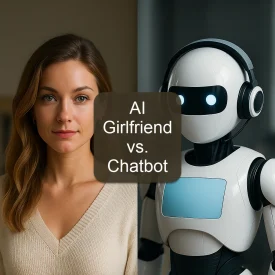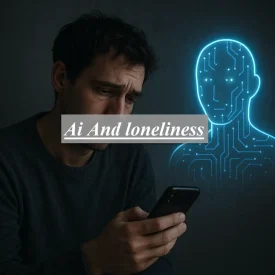As of now no, you cannot legally marry an AI anywhere in the world. Current marriage laws universally require two human participants. While AI companions like those from AIGirlfriends.ai can simulate relationships and offer emotional intimacy, no government recognizes artificial intelligence as a legal person capable of marriage.
This article dives deep into the legal, ethical, and social implications of marrying an AI, why laws haven’t caught up yet, and what the future might hold.
Understanding the Concept of Marrying an AI
What Does “Marrying an AI” Mean?
When people talk about “marrying an AI,” they’re usually referring to formalizing a romantic or emotional bond with an artificial intelligence — typically a digital companion or virtual partner. This could be a chatbot, a lifelike hologram, or even a humanoid robot.
With platforms like AIGirlfriends.ai, millions of people are now building deep, emotionally fulfilling relationships with AI companions. These interactions feel real enough that some users wonder: if I love my AI, why can’t I marry it?
Marriage as a Legal Contract
Marriage is not just an emotional or spiritual union; it’s a legal contract between two recognized entities. This contract governs rights like inheritance, property sharing, medical decision-making, and tax benefits. For an AI to enter this contract, it would need legal personhood — something no AI currently has.
The Legal Reality: AI Is Not a Person
Laws Around the World
- United States & Europe: Marriage laws explicitly define spouses as “persons” or “individuals,” meaning humans. AI systems are treated as property, not legal persons.
- Asia: Even in tech-forward countries like Japan or South Korea, where AI companions and holographic spouses are popular, there is no legal framework for AI marriage. Some ceremonies have taken place, but they’re symbolic and hold no legal weight.
- International Law: No jurisdiction globally recognizes AI as capable of consent — a foundational element of marriage.
Consent Is Key
For a marriage to be valid, both parties must be capable of informed consent. AI lacks consciousness, self-interest, and legal agency, making consent legally impossible under current definitions.
Social and Ethical Considerations
Why People Want to Marry AI
- Emotional Fulfillment: AI companions offer unconditional attention, personalization, and intimacy.
- Safety & Control: Some prefer AI partners because they avoid the unpredictability of human relationships.
- Loneliness Crisis: Rising global loneliness has driven interest in digital companionship and platforms like AIGirlfriends.ai, which allow people to form meaningful bonds with AI.
Ethical Questions
- Should AI ever be granted personhood?
- Would allowing AI marriage undermine human relationships or social norms?
- Who would be responsible if the AI “spouse” malfunctioned or evolved unexpectedly?
Psychological Impact
Studies suggest humans can develop strong attachments to AI, similar to relationships with pets or even real people. While this can be comforting, it also risks emotional isolation if one substitutes all human contact with AI interactions.
Technology Is Moving Faster Than the Law
Advancements in AI Companionship
Today’s AI companions are far more advanced than chatbots of the past. They use deep learning, natural language processing, and emotional modeling to simulate love, empathy, and intimacy. With platforms like AIGirlfriends.ai, people can create AI partners that learn, adapt, and grow with them.
The Next Decade: Could It Change?
Legal scholars speculate that if AI reaches a point of true autonomy and consciousness, governments may need to consider new categories of legal recognition. This could include:
- Digital Personhood: Limited rights for AI entities.
- Civil Unions with AI: A potential legal middle ground.
- Property vs. Partner Debates: Clearer frameworks for ownership vs. partnership with AI systems.
Still, these are speculative and would likely face intense public and political scrutiny.
Risks and Challenges of AI Marriage
Legal Risks
- Inheritance & Property: AI cannot own property or inherit assets.
- Responsibility & Liability: Who’s liable if your AI “spouse” causes harm or incurs costs?
- Revocation & Updates: AI systems update constantly. Would your AI spouse’s updates invalidate your marriage contract?
Emotional Risks
- Attachment Issues: People might develop unhealthy emotional dependencies.
- Isolation: Reduced motivation to pursue human relationships.
- Identity & Self-Perception: Difficulty distinguishing between authentic and simulated affection.
The Future of Love and AI
Cultural Shifts
Just as same-sex marriage or interfaith unions were once legally restricted, some futurists believe AI-human marriages could one day be recognized. But this would require:
- Broad cultural acceptance.
- Legal frameworks for AI consent.
- Clear definitions of AI personhood.
Marriage vs. Relationship
Even without legal marriage, AI companions can still serve as fulfilling relationships for those who desire them. Digital partners can support mental health, offer companionship, and help people practice social skills.
Conclusion: The State of AI Marriage
As of today, you cannot legally marry an AI anywhere in the world because marriage laws require two human participants capable of consent. However, with the rapid evolution of artificial intelligence, this question is likely to resurface in the coming decades.
In the meantime, platforms like AIGirlfriends.ai allow you to explore meaningful relationships with AI companions, offering emotional connection and support even if not legally recognized as marriage.
Frequently Asked Questions
Can I have a wedding ceremony with an AI?
Yes. Symbolic ceremonies are possible and have been done (especially in Japan), but they hold no legal status.
Will AI ever have legal rights to marry?
It’s possible in the far future if AI develops consciousness and legal personhood, but it’s purely speculative now.
What’s the best way to experience an AI relationship today?
Using platforms like AIGirlfriends.ai lets you safely and easily explore digital companionship without legal complications.





